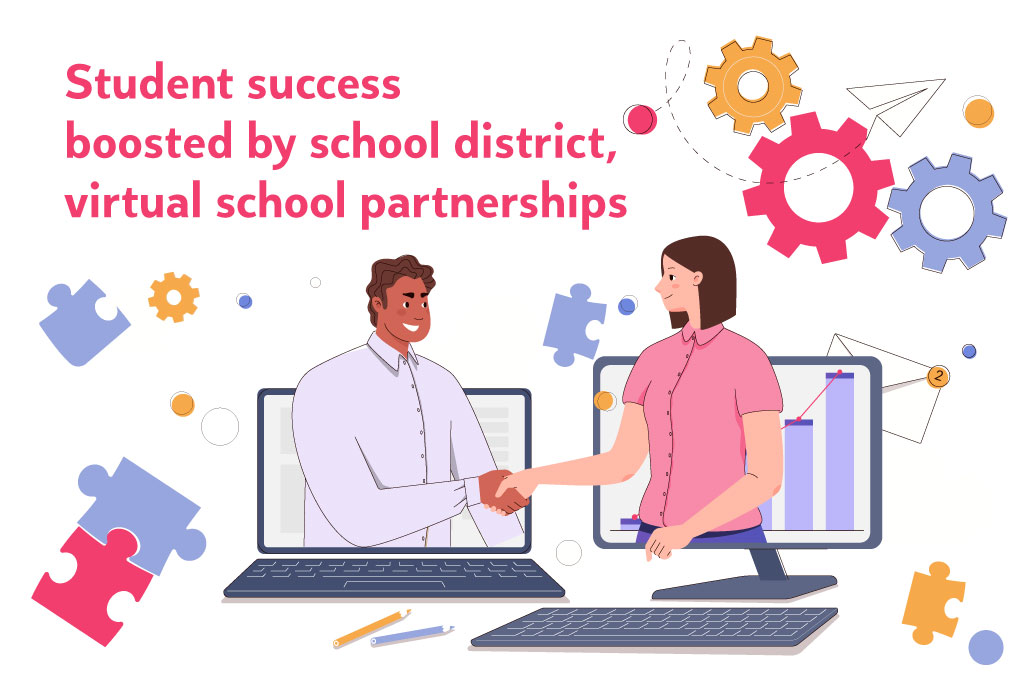1st in a two-part blog series

Having a great partner makes all the difference in life. For school districts across the U.S., joining forces with a high-quality online education provider offers students and teachers additional opportunities for success.
While the COVID pandemic necessitated that schools quickly adopt emergency online learning, many districts had already embraced the benefits of hybrid and online learning. They realized that, with the right partner, the boundaries of traditional learning can give way to a whole new world of educational opportunities.
“Online learning is here to stay,” said Jenny Oakley, director of eLearning & Literacy, Metropolitan School District of Martinsville and an Indiana Online partner. “It is the way of this generation, and that trend toward digital content will continue to grow. Martinsville immediately pivoted to address this reality, and we are honored to now be in this unique space we serve.”
A member of the Virtual Learning Leadership Alliance, Indiana Online is among 20 member programs offering supplemental online learning to school districts throughout the country. All are committed to serving as trusted education partners through online, hybrid, and supplemental learning.
A custom online fit for each district’s unique needs
Just what does a supplemental online school partnership look like? That’s the beauty of it – programs are designed to fulfill the district’s needs and vision. For Greene County Public Schools in Virginia, its collaborative efforts with Virtual Virginia, another VLLA member, covers several programs.
“We partner with Virtual Virginia so we may offer a larger variety of electives, AP, and world language course options,” said JoAnne Fox, online learning coordinator for Greene County Public Schools. “We also partnered with Virtual Virginia in implementing a learning management system that we use to deliver instruction to students who may miss school for a variety of reasons, including extended illnesses.”
Many districts, especially those in rural communities, rely on supplemental online education to broaden their course selections. Some need the basics while many others want to offer their students an array of choices so they can explore interests and discover new ones.
The Newport School District in Pennsylvania offers K-12 full-time online schooling. Students in K-5 are monitored and taught by the school’s own teacher while grades 6-12 are monitored by one in-house teacher, an advisor, and certified teachers provided through vendor partnerships and the Capital Area Online Learning Association (CAOLA), a VLLA member.
“Supplemental online learning is utilized significantly at Newport,” said Scott McGrady, director of curriculum, instruction and assessment for the Newport School District. “As a small district, we utilize online learning to supplement core curriculum, add supports for students, provide enrichment opportunities and experiences, enhance our career exploration program, and offer courses that would not otherwise be available.”
From American sign language and AP classes to educator enrichment and certifications, districts recognize the value of a trusted online resource.
The many benefits of supplemental online learning
Students can easily recite what they like about online learning – flexibility, self-paced, personal teacher interactions, self-motivating, and more. Districts also see many benefits, including enhanced student-teacher interactions, according to Bruce Enzmann, virtual learning coordinator of the Office of Teaching and Learning for Virginia Beach (VA) City Public Schools.
“Because it’s highly adaptable, virtual learning can often better meet students where they are academically, emotionally, and socially,” said Enzmann. “Virtual classrooms allow teachers to offer more support to their students through phone calls, emails, chats, videos, text messages, and more.”
Enzmann credits online education for encouraging students to be self-motivated and organized while developing critical problem-solving and research skills. Like others, he also notes online learning’s flexibility as a popular benefit for not only students but teachers, too.
“The benefits for teachers are like those for students. Teachers can work from their home office or any remote location, and it typically involves fewer hours teaching whole group sessions and more time in asynchronous and small-group instruction,” he said.
Just as there are all types of learners so, too, are there reasons for school districts to align with a supplemental online provider that best meets their needs and those of their students, educators, and community.

